Farmers’ protest completes one year; 90-yo Bhagwan Kaur has been camping for a year now
Farmers and their families from Punjab and Haryana joined the protest against the farm laws, fighting the harsh winters, unseasonal rain and blistering summers. Gaon Connection visited Tikri border, one of the protest sites, to gauge the mood there and find out why the protestors haven’t returned to the comfort of their homes yet.

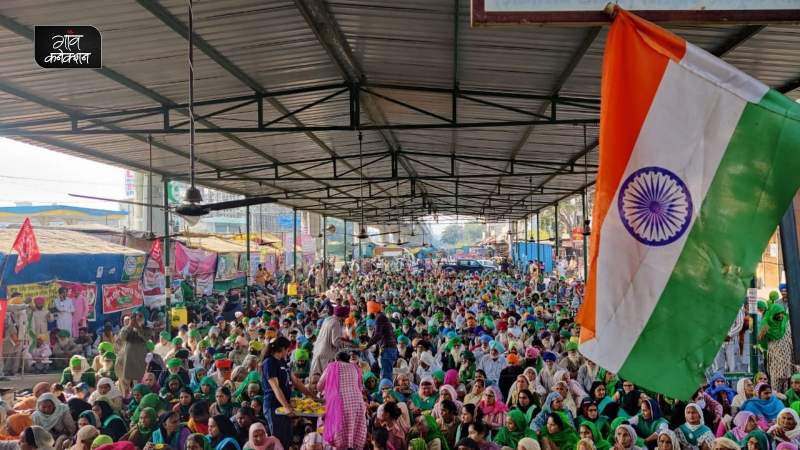
Tikri, Delhi-Haryana Border
From the green line of Delhi Metro, one can see a line of tents and catch a glimpse of a make-shift stage. As the train approaches the Pandit Shree Ram Singh metro station close to the Tikri border, the scene of action for the past year, where hundreds of farmers have picketed themselves in protest against the three farm laws, becomes visible.
There are police barricades everywhere. Outside the Pandit Shree Ram Singh metro station, people dry clothes, wash utensils, prepare tea… just another day at the protest site.
“I had never thought in my wildest dreams that I would have to live on roads despite having a house of my own. But when the kaala kanoon (farm laws) was introduced, we knew we would have to take a stand, not just for ourselves but for our future generations just like our forefathers fought for our freedom,” Surinder Dhandia, a farmer from Fazilka, who has been living in a tent at Tikri with his family of ten, told Gaon Connection.
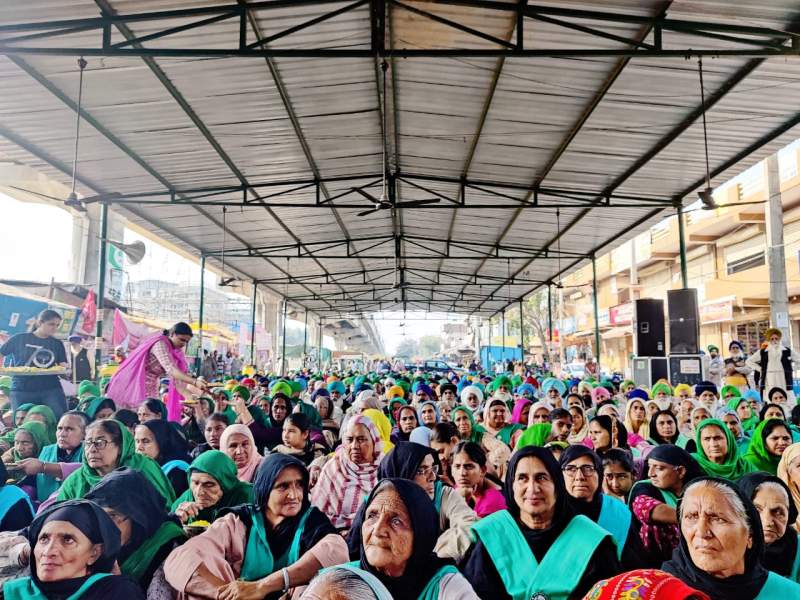
Also Read: Explained: Controversial farm laws and the procedure to repeal them
Farmers from Punjab and Haryana have been camping at the Delhi borders since November 26 last year demanding the repeal of the three farm laws – The Farmers’ Produce Trade and Commerce (Promotion and Facilitation) Act, 2020; The Essential Commodities (Amendment) Act, 2020; and The Farmers (Empowerment and Protection) Agreement on Price Assurance and Farm Services Act, 2020.
Today, November 26, the farmers’ protest completes one year.
Exactly a week back, on November 19, Prime Minister Narendra Modi in his address to the nation announced to repeal the farm laws in the winter session of the parliament. Two days back, on November 24, the Union Cabinet also approved the repeal of the agri laws.
Also Read: Jubilant mood at Singhu border but farmers want repeal of farm laws stamped, sealed and delivered
Calling it a “sad day for farmers” and “a sad quarter century for agriculture reforms,” Gautam Chikarmane, Vice President at Observer Research Foundation, an independent global think tank based in Delhi, wrote in his blog that “India’s agriculture has now been condemned to be crushed under the feet of wealthy farmers, traders and middlemen for another full generation—no political party will dare touch these reforms for a quarter century.”
Elaborating about how interests of farmers who are not wealthy and do not own vast tracts of land were missing from the farmers protest, he wrote, “With the U-turn, Modi has condemned them to another quarter century of economic subjugation. They lose thrice over. One, they lose their flexibility to sell their produce at better prices outside mandis. Two, they return to the era of price controls, with high barriers to warehousing that protects perishables. And three, they lose their protections while engaging with institutions.”
Meanwhile, despite Modi’s announcing repeal of the laws, farmers are refusing to return to their villages, as they want discussion with the government on minimum support price (MSP) and the Seed Bill.
Also Read: ‘Farm laws are set to be repealed, but we want resolutions’: Rakesh Tikait
Tikri Border – A new home away from home for many
While Surinder Dhandia has not left Tikri in the entire past one year, his wife, three sisters, and three nephews have been coming and going.
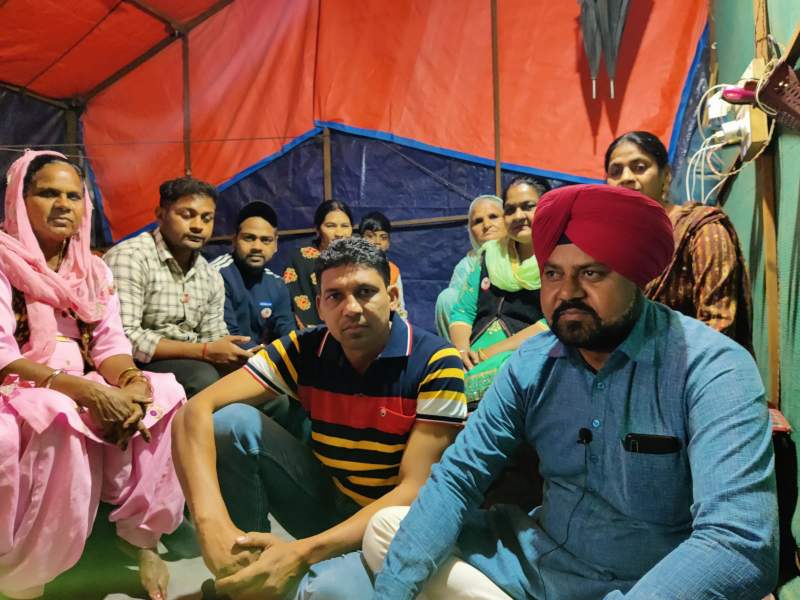
“We were accustomed to the comforts of our home where everything was available. Here, we had to build everything from scratch. There were no toilets, no place to bathe or even cook. We have built another home here, so now we are used to living here,” Harjeet Kaur Dhandia’s sister, told Gaon Connection.
The resentment for the farm laws runs deep amongst the farmers from Punjab. Sharing the same tent with the Dhandias are Pyari Bano and her son, Harbhajan Lal. “Humei marna manzoor tha par kaale kanoon ko wapas liya bina nahin jayenge [We were ready to die, and we’re not going back until the farm laws were repealed],” the 60-year-old farmer from Dhandi Qadim village in Fazilka district, told Gaon Connection.
Pyari Bano had spent the entire year at Tikri with her son and said she would miss this ‘other home’ they had made on the Rohtak-Delhi highway (NH-10).
90-yo Bhagwan Kaur, the oldest protesting farmer
Perhaps the tag for the oldest protesting farmer at Tikri goes to Bhagwan Kaur from Barnala. She is 90 years old and has spent the entire year at Tikri, since she came here on November 26, last year.
“Unki ghalti thi, humari koi ghalti nahin thi (it was the government’s fault not ours). Hum to apna haq maangne ke liye aaye the. Jaayungi to haq lekar jayungi, warna yahin mar jaungi [we came here to demand our rights and I will return only after I win, or else, I will die right here],” she told Gaon Connection.
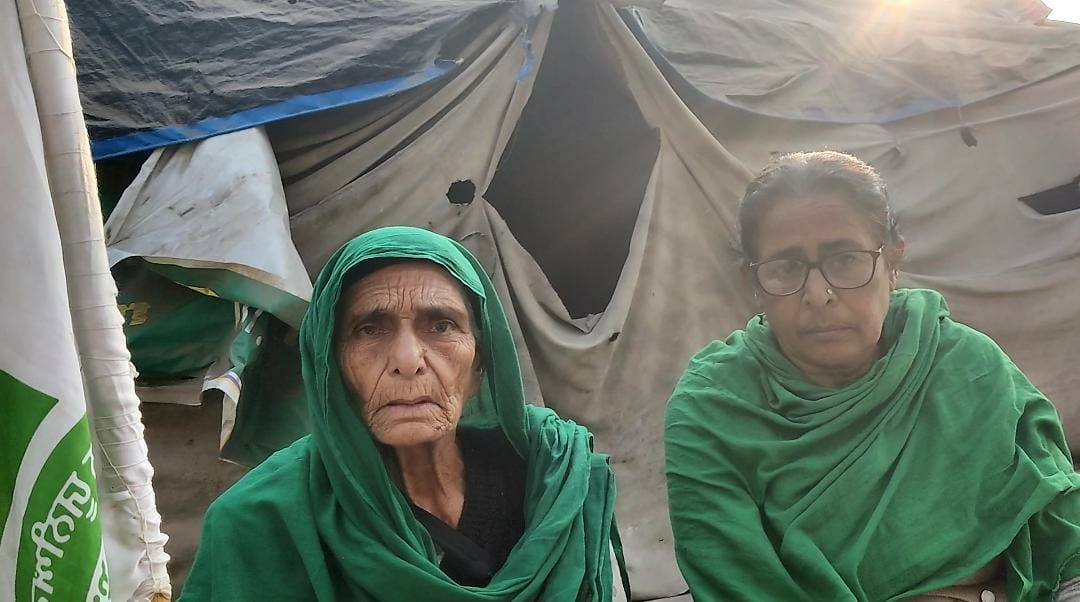
Neither her children’s pleas to return home, nor the pandemic could budge her. “I have seen a lot here – sardi bhi lagi, garmi bhi lagi but I didn’t fear anything here. Apna haq lekar hi jaana hai mujhe,” she repeated.
Another protestor who has spent 365 consecutive days at Tikri border is Balwinder Singh from Fazilka, Punjab.
He joined the march to Delhi along with his elder brother, Harcharan Singh Sokhpara and while his brother went back, Balwinder stayed back. While he was disgruntled at the fact that they had to leave their farms behind and come here to fight for their rights and demand a repeal of the farm laws, Balwinder was industrious enough to start his own vegetable patch, just a stone’s throw away from the metro station. The land was provided by Jeevan Jyoti Hospital, he said.
“I had a lot of spare time on my hands and since I couldn’t work on my field, I started growing onions, tomatoes, spinach, carrots, and radish here on this less-than-an-acre of land,” he told Gaon Connection.
Langar seva
Close to the makeshift stage, from where announcements and sporadic speeches happen, there is a tent where a langar is being prepared by a students’ body calling themselves Jamindra Students organisation.
It looks like a well choreographed scene with a group of women in one corner kneading mountains of dough to make rotis while in another circle vegetables are being cleaned and prepped for the subzi, to the chants of Waahe guru ji da khalsa, waahe guru ji di fateh, blaring from loudspeakers.
Satwinder Kaur deftly flips the cooked rotis from the tavaa into a basket. She has spent nearly ten months of the year at Tikri, where most of her days were spent volunteering at the langar. She said after spending so many days here, Tikri ‘felt like home’.
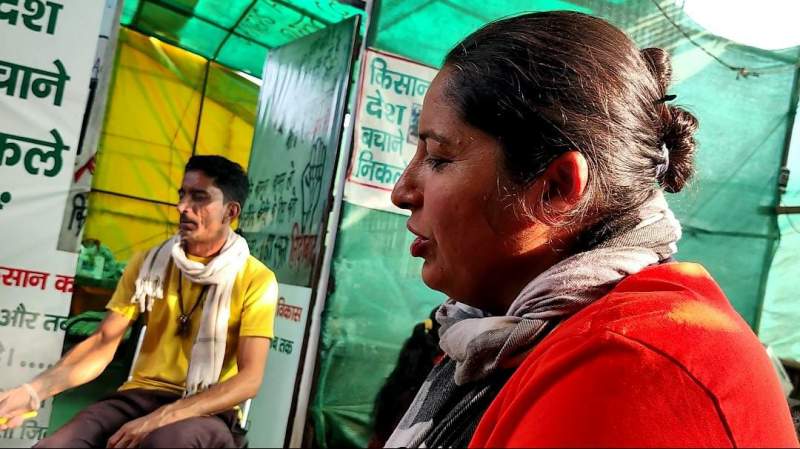
Like so many others there, Satwinder was not in such a celebratory mood over the farm laws being repealed. “To be very honest, there is nothing to celebrate.We have lost so many people to this cause, we braved the harshest winters in Delhi, the heatwaves of the summer, and unseasonal rains. But yes, the purpose for which we came here has more or less been fulfilled,” she said.
But she said she had become attached to Tikri. “Just like one gets attached to their colleges and schools. Earlier, I would hesitate to come to Delhi because that meant wasting two days in travel, but now I know the trains and buses plying to Delhi and their timings at the tip of my fingers,” Satwinder laughed.

